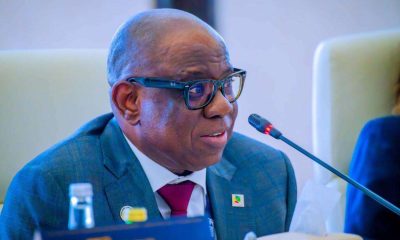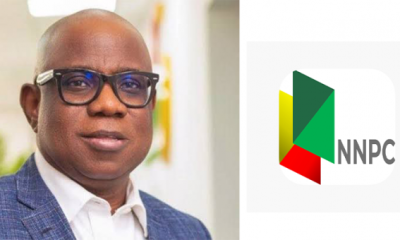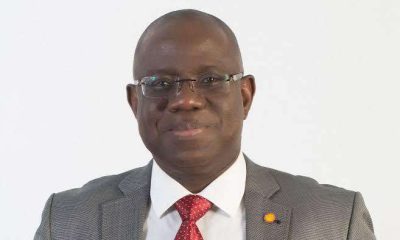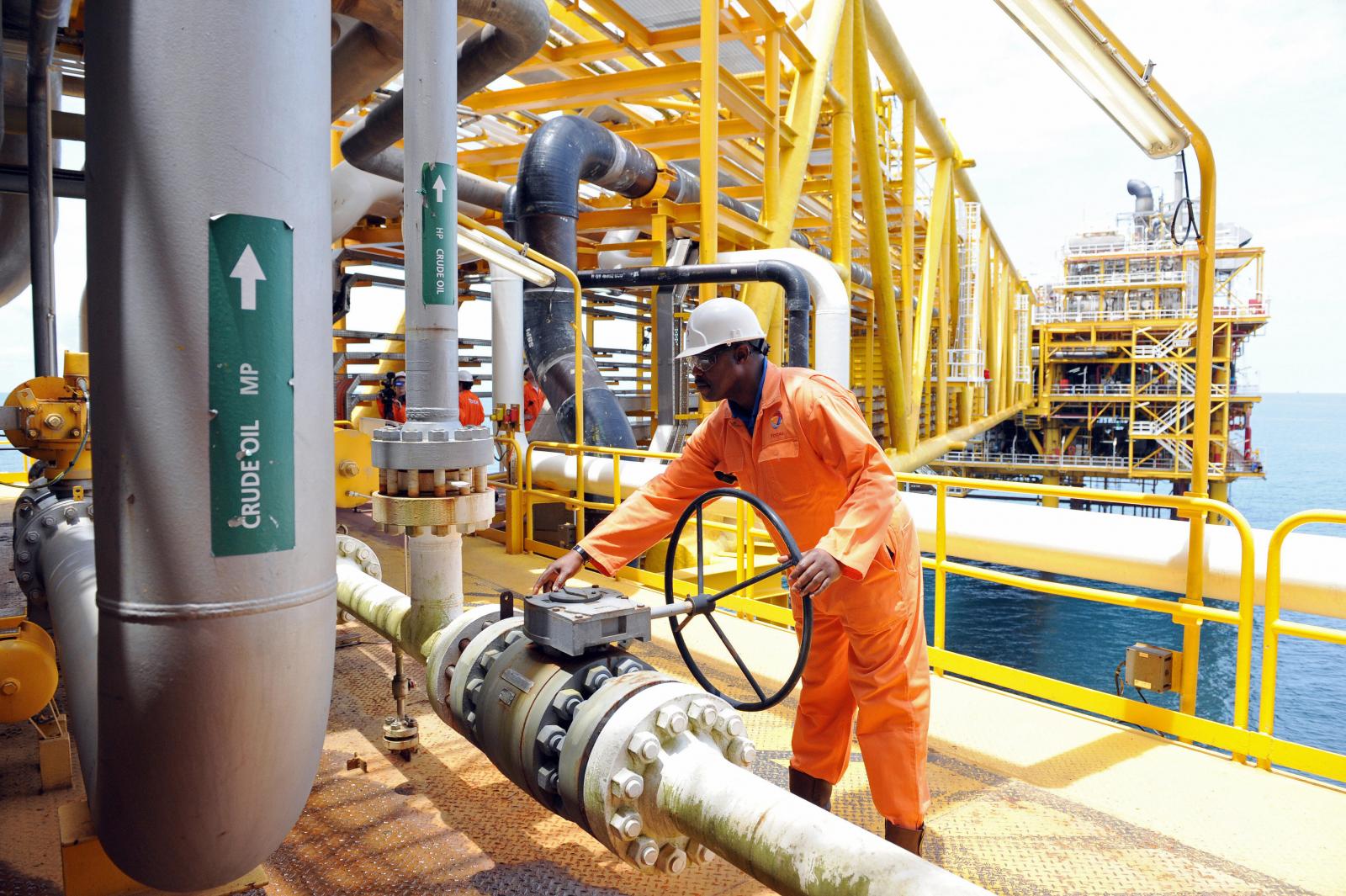Business
Multibillion dollar fraud allegations rattle NNPC

…as the corporation fights back
By ADEBAYO OBAJEMU
These are indeed difficult times for the Nigeria National Petroleum Corporation, NNPC. If it were only the challenge of reinventing itself in a much desired reform, it would have been less of a worry, but it is beyond the challenge of its many ‘sins’, which range from corruption to political interpretation of being used as a lapdog of politicians, which make reform critical.
However, there is a bigger challenge: the internal crime syndicate that threatens to push its agenda of ridiculing Nigeria at global stage. Only recently, an oil trading company, Samano Sa De CV, wrote a letter to the Group Managing Director of the Nigerian National Petroleum Corporation, Mele Kyari, demanding five per cent reward for exposing the diversion and theft of 48 million barrels of crude oil.
At the current price of global crude oil which is $43 per barrel, the stolen oil is expected to be worth $2.06bn. The alleged theft is said to have taken place in 2015. The allegations are contained in a letter signed by lawyer, Gboyega Oyewole, on behalf of the whistleblower dated July 23, 2020.
The letter is titled, ‘Formal Request for the Payment of five per cent Whistleblower Compensation For Information Furnished In Respect of Crude Oil Stolen from the Federal Republic of Nigeria’. In the letter, it was stated that the Group Managing Director of the NNPC, Mr. Mele Kyari, the late Chief of Staff to President Buhari, Abba Kyari; and Mr. Umar Mohammed were all informed of the stolen crude and were expected to take action.
A subsequent letter written to the President by the whistleblower, was, however, prevented from getting to him. The whistleblower said in October 2015, the stolen crude was moved from China without the knowledge of President Buhari and sold illegally by some government and NNPC officials with the proceeds not remitted to the government’s coffers.
When the whistleblower pushed for the agreed five per cent cut of the sale of the crude for exposing the theft, its officials were harassed and issued death threats. The letter read in part, “Sequel to this policy, our client, being a reputable and credible company, promptly brought to the knowledge of the Nigerian Government, information as to criminal activity involving the NNPC and the stolen product.
“This information was given to high ranking officials of the Nigerian government to wit; Mr. Mele Kyari, the Managing Director of NNPC; Mr. Abba Kyari, the then Chief of Staff to the President; and Mr. Umar Mohammed. Consequently, it was agreed that an investigation into the stolen product should be made to ascertain the veracity of the information and garner more facts as to the fraudulent activities.
“It was also agreed that if the information is found credible, the perpetrators of the offence would be apprehended and that compensation due to our client for the information brought forward would be awarded. Further to the above stated discussions, our client through its Chief Executive Officer, Mr. Jose Salaza Tinajero (its representative) wrote to President Muhammadu Buhari notifying him of the stolen products as advised by the high ranking officials.
“The said letter was delivered to Mr. Umar Mohammed, who to the surprise of our client, failed to deliver it to the President.”
Attached to the letter were several documents including bank transfers, names of vessels and their captains to show that the stolen products had been illegally sold by some top government officials in connivance with the NNPC. The firm also attached chats between some of the principal players. When contacted, NNPC’s Group General Manager, Group Public Affairs Division, Kennie Obateru, said the oil firm was aware of the accusation but would not respond now.
“We won’t respond to it now, but at the appropriate time we will make our position known to the public,” he said.
This small matter of crude oil theft first reported by Sahara reporter has snowballed into international embarrassment especially for a government that came to power on the crest of anti-graft posture.
Finally, through its lawyer, Chief Afe Babalola, SAN, NNPC has responded to the claims of Samaco, saying the whole report and claims were a ruse, a charade by a syndicate to defraud the government. The NNPC, Thursday formally commented on the claim that Nigerian officials and the corporation’s personnel secretly sold off 48 million barrels of stolen Nigerian crude oil in China and shared the proceeds amongst themselves.
The statement reads: Failed attempt by an international crime syndicate to intimidate, extort and defraud the Nigerian national petroleum corporation and the Federal Government of Nigeria. We Act As Counsel To The Nigerian National Petroleum Corporation.
“The attention of the Nigerian National Petroleum Corporation (NNPC) has been drawn to several online publications, particularly the Sahara Reporters’ publication of 26th July 2020, captioned “EXCLUSIVE: How Nigerian Government Officials, NNPC Staff Sold 48 Million Barrels Of Stolen Crude Oil, Issued Death Threats To Whistleblower,” sponsored by SAMANO SA DE CV.
The Nigerian National Petroleum Corporation is also aware of several television broadcasts and commentaries in respect of the same subject. These publications replicate the content of a recent letter forwarded to NNPC on behalf of SAMANO SA DE CV by its Solicitors, Messrs. Lords & Temple.
The Management of the Corporation states emphatically that these publications are replete with falsehoods, offensive, gold-digging and a calculated attempt by the said SAMANO SA DE CV (SAMANO) working in concert with its local and international agents to intimidate, blackmail and extort money from the Federal Government of Nigeria and NNPC. Given the attention which these publications have generated, NNPC deems it necessary to make the following clarifications:
SAMANO first contacted officials of the Federal Government of Nigeria sometime in 2015 indicating that it had been approached by an unnamed group in the People’s Republic of China to buy 48 Million Barrels of Nigerian Crude Oil which they believed to have been stolen from Nigeria. According to SAMANO, this crude had been stolen and shipped to China before the inception of President Buhari’s administration in 2015.
SAMANO requested that it be allowed to purchase the stolen crude after its recovery by the Federal Government. Shortly thereafter, SAMANO indicated that it was not interested in buying the said stolen crude as it only obliged the Federal Government with the information to assist the President Buhari-led administration’s fight against corruption.
The Federal Government and NNPC receive hundreds of spurious claims of this nature daily, and they always turn out to be false. NNPC also believed that based on the operations and state of the international crude oil market in 2015, it was impossible to ship 48 million barrels of crude oil from Nigeria to China without any record or trace of same.
For context, as of 2015, the daily production of crude oil in Nigeria was below 1.6 million barrels. Therefore, 48 million barrels of crude oil would have been the total production capacity of the country for a whole month. It was and remains simply impossible for one-month crude oil production for the entire country to disappear without any record or trace from the shores of the country.
NNPC was also aware that as at the material time and considering the fact that the People’s Republic of China is one of the most regulated economies in the world, the export of Crude Oil from Nigeria to China was exclusively undertaken by four known companies approved by, under the control, ownership, and management of the Chinese Government. It would, therefore, have been impossible to transport 48 million barrels of crude oil from Nigeria to China without the active involvement of the said companies.
Again, from an economic perspective, it made little sense that anyone would store that volume of crude oil in China for such a considerable period having regard to the attendant significant storage costs. It is noteworthy that the Chinese Government had, through its officials, stated emphatically in response to this allegation at different fora including the United Nations General Assembly that there was NO stolen Nigerian crude oil stored in any port or terminal or storage facility in China.
Despite these reservations and in view of the fact that transparency, accountability, the fight against corruption and the recovery of the country’s looted resources have been integral components of State policy under the administration of his Excellency, President Muhammadu Buhari, the Federal Government of Nigeria set up the Presidential Committee on Recovery of Stolen Nigerian crude oil in response to the claims made by several companies including SAMANO over alleged stolen Nigerian crude oil stored in China.
The said Presidential Committee requested that SAMANO furnish it with evidence in proof of its allegations to enable it to investigate and verify its claim. Still, SAMANO refused, neglected or failed to provide the Committee with any cogent and verifiable evidence in support of its allegations.
Notwithstanding the failure of SAMANO to produce verifiable evidence in support of its allegations, for completeness, relevant officials were mandated to pay an in-person visit to China and further investigate SAMANO’s claim.
During this fact-finding trip to China, it was discovered that SAMANO’s claim was false as there were no 48 million barrels of stolen Nigerian crude oil or any stolen Nigerian crude oil in any port, terminal or storage facility in China. It was also discovered that all the documents previously presented by SAMANO in support of its claims were not genuine. A report of this finding was issued by the Committee to Mr. President. Consequently, the Federal Government terminated all communications with SAMANO as it became apparent that its claim was a hoax.
When SAMANO realized that the Federal Government was no longer interested in the non-existent stolen crude, it resorted to blackmail and intimidation of key officials of the Government. SAMANO threatened that it would publicize the fact that the non-existent crude had been recovered, sold and proceeds looted by senior government officials and other personalities when it knew this was absolute falsehood.
SAMANO made several demands including the demand that it be paid the sum of $125,000,000:00 (One Hundred and Twenty-Five million United States Dollars) by the government officials to prevent it from disclosing this false information to the public.
This demand soon metamorphosed into harassment as SAMANO embarked on a mischievous exercise to embarrass the Federal Government of Nigeria on international media platforms and before several international institutions like the Organization of Petroleum Exporting Countries (OPEC) all in a calculated bid to blackmail the Federal Government of Nigeria and NNPC into paying it a significant amount of money as compensation.
As a result of the constant harassment, NNPC was constrained to make a formal report to the Department of State Security (DSS) and Nigeria Police while other victims wrote petitions in respect of the same subject to the Honourable Attorney-General of the Federation.
After a thorough investigation by the Police and DSS and confessions by agents of SAMANO, it was discovered that the allegations of conspiracy, forgery, obtaining money by false pretence, blackmail and extortion were well-founded and that some of the fraudulent activities of one Mr. Ramirez and Mr. Jose Salazar Tinajero (both agents of SAMANO) constituted a threat to the national security of Nigeria.
During its investigation, the Nigerian Police discovered that SAMANO is part of a notorious crime syndicate that habitually intimidates, blackmails, and defrauds government officials and other high-profile persons. For instance, it was discovered that Mr. Ramirez, SAMANO’s representative, was indicted by the U.S. District Court in the Southern District of Texas as the mastermind of a scheme leading to the loss of several millions of dollars through various mail and wire frauds between 2010 and 2013.
The Police became aware that Mr. Ramirez fled the United States of America and settled in Nigeria where he continued his criminal activities in conjunction with SAMANO and its Managing Director. There is a subsisting warrant issued by the United States Government for the arrest of Mr. Ramirez. His wife has been convicted in the United States for her role in a visa lottery scam he masterminded.
NNPC is aware that this investigation led to the filing of Charge No.: FCT/HC/BU/CR/134/2019 between Federal Republic of Nigeria v. Marco Antonio Ramirez & 4 Others at the High Court of the Federal Capital Territory, Abuja. Some of the offences in the charge are criminal conspiracy, forgery, extortion and attempt to obtain money by false pretence.
NNPC also understands that Mr. Ramirez and his cohorts are being prosecuted by the Economic and Financial Crimes Commission (EFCC) for other unrelated offences at the High Court of the Federal Capital Territory, Abuja in Charge No: FCT/HC/CR/147/2016 and the Federal High Court, Lagos in Charge No: ID/2763/2016.
NNPC is convinced that the chameleonic posture of SAMANO as a potential buyer, then gratuitous informant and subsequently a whistle-blower demonstrates its desperation to hoodwink and defraud the Federal Republic of Nigeria by all means.
In its latest correspondence to NNPC, SAMANO claims that it is entitled to compensation for supplying information on the missing crude oil pursuant to the Federal Government’s Whistle Blower Policy. However, the information (which has proved to be pure falsehood) forming the basis of this claim was furnished in 2015 whilst the Whistle-blower Policy of the Federal Government only commenced in December 2016.
SAMANO also failed to follow due process or establish that the information it allegedly provided led to any recovery or that the information was disseminated through the proper channel – the Federal Ministry of Finance online portal or in writing to the Federal Ministry of Finance or the Presidential Initiative on Continuous Audit Unit.
SAMANO’s actions were contrary to the laid down policy of the government on whistle-blowing. Indeed, SAMANO does not qualify as a whistle-blower under this policy, particularly as no benefit whatsoever was derived from the piece of falsehood it provided at the time.
In view of the foregoing, NNPC urges members of the public to disregard the publications sponsored by SAMANO. They are at best diversionary and in furtherance of its scheme to fleece Nigeria. SAMANO’s attempt to shift attention from the on-going criminal charges against its Managing Director and agents will not fly. NNPC has instructed Counsel to take appropriate legal actions against SAMANO and its officers for the injury done to the Corporation and its officials by the falsehoods peddled by SAMANO and its agents”, the statement concludes.
It would be an understatement to say that the future of the Nigerian National Petroleum Corporation, NNPC is on the block. Given the shifting fortunes in the sector, and the current reality, it is clear that the corporation is saddled with the challenge of adapting to the ongoing currents as they affect the sector and the national economy.
Long seen and widely considered as the single most important cash cow in the land, the NNPC today is finding that it plainly has to reform or be reformed. While it has for long been used to calling the shots, it is now under immense pressure to explain itself. In the past few weeks, its top brass have been dragged to the National Assembly to provide explanations on the operations of the corporation.
In one such appearance, the focus of inquiries was the drilling cost of crude with the corporation having to explain why its figures were above the global equivalent.
There have also been questions about the profitability of the corporation. Within the past weeks presumed audit documents were leaked to the public indicating that at least one of the refineries ostensibly being managed by the corporation, the Kaduna Refinery and Petrochemical Complex, KRPC may have expended as much as N65billion while at the same time posting zero revenues!
Again, while it is true that the ongoing COVID 19 pandemic has surely taken its toll on the corporation, what with the challenges of lowered prices, stalled cargoes and output reduction, the fact of the inability of the corporation to deliver even greater value when it was experiencing better economic fortunes have also made many to conclude that the corporation is indeed some basket case that requires comprehensive structural resetting.
Kyari’s challenge is not made any less difficult by the fact that Nigeria’s mismatched federal structure today has unwittingly encouraged both public and private sector functionaries at different levels to ‘lazily’ wait upon the NNPC and by extension the omnibus Federation Account almost literally for their breakfast, lunch and dinner!
Whether it is state governors and local government chairmen who want the money to continue to remain in charge of their own bits of the federation or businesses in search of foreign exchange with which to source imports and continue to operate in the import dependent economy that we run, there is a steady stream of pressure on the NNPC GMD to almost literally bring water out of the rock!
Even before the current COVID 19 season and its additional burdens, the office of GMD of the NNPC had indeed been gripped in a suffocating crisis of political interpretation. With about half of the Nigerian population mired in poverty, a non-decelerating birth rate, non-improving educational sector and poor productivity overall, the NNPC has come to be heavily burdened as being about one of the few organizations that make up a kind of oasis in an arid landscape of squalor, want and non-engagement.
Thus, almost everyone with a university degree or even less wants to work in the NNPC and political battles are regularly pitched over which segments of the nation may be getting a far more disproportionate share of the NNPC largesse at the expense of other contending segments and interests.
Only a few weeks ago, the Pan Niger Delta Forum, PANDEF penned a widely publicized protest note to the authorities complaining over the skewed nature of appointments into the principal power positions in the corporation. Dutifully, the corporation has since made a statement explaining that it ensures basic fidelity to competence and best practices in both the recruitment and promotion of its personnel but not too many out there are persuaded. The rain really never stops falling.
One of the other perception issues related to the NNPC is that it is the politicians’ piggy bank. Other than what it does as the prime provider of funds to government, it has also been said to be one of the first go-to institutions when politicians desire to fund their next electoral contests more particularly at the federal level.
Even in the recent COVID-19 era, the Corporation has been rushing to the aid of both governments and individuals; shelling out funds either to get stuff like Personal Protection Equipment, PPEs for medical personnel engaged in the frontlines of fighting the pandemic or the payment of hotel bills and associated lodging costs for returnee Nigerians. But perhaps the greatest challenge to the NNPC today is its future.
For many years the corporation seemed to have settled into a mould where it was not under any real pressure to deliver value-for-money. Today however, the terrain is changing with the projected coming on stream of the Dangote Refinery Petrochemical Complex and a few other smaller modular-type refinery developments in notably the Niger-Delta region of the country. How would NNPC play in the upcoming era?
This is the challenge today before Kyari, who if he continues to keep the job, could eventually end up in history as the last of the strong breed, the transition manager who supervised the process of transforming the NNPC from an imperial economic behemoth and monopoly to a new organization that is primed to share power with other new entrants into the field as the Dangote Petrochemical Refinery Plc. How would that day exactly and eventually play out?
Some analysts think that part of the thinking going forward for the corporation would be for it to use the enormous state-backed retail leverage it had developed in the past to maximum advantage in the years ahead.
Given the challenges that have come with scarcity of products and the hike in pump prices over the years, the corporation had been encouraged to go full throttle on the statist model of setting up newer and newer retail openings to serve as some kind of price control mechanism. It is this network that commentators say it should focus on making available as distribution centres to other nimbler and better-focused local refiners that are presently gearing to go. While there is no categorical outline about this yet, however some industry analysts are already hazarding how things are likely to pan out on that new day.
According to Chike Okafor, a well-heeled industry player who spoke with BusinessHallmark recently, the signs are clearly evident that a very massive reset would inevitably follow in the wake of the coming on stream of the Dangote refinery and other fleet footed private sector operators.
‘I think the management of NNPC should begin to brace for the days ahead. With players like Dangote Refinery being able to negotiate deals to get crude supplies without extraordinary constraints, and perhaps at costs that are lower than the designated international rates and with their not being hamstrung by factors and variables like taxes (at least in the pioneering era), demurrage, storage, shipping and landing costs and foreign exchange price fluctuations, they may be able to make net savings of about 40 per cent if not more in terms of their basic cost structure relative to the current prices of mainly imported refined products.
“With this, they would be on quite a firm footing to crash prices which the already hamstrung NNPC may not be able to match. It will indeed be a new day where the NNPC would almost invariably be struggling to catch up; and where it may be circumstantially constrained to open up its retail centres for the dispensing of products from these newer entrants if it would not suffer the fate of previous monopolies like NITEL and NEPA.”
For the embattled dinosaur, these are very clearly not easy times










